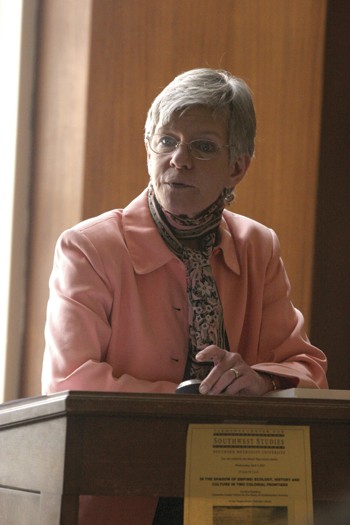
In yesterday’s monthly Southwest Studies Brown Bag, Dr. Cynthia Radding spoke about ecology and history of two colonial frontiers. (Christina Parrish)
The Clements Center for Southwestern Studies Brown Bag Lecture series presented Dr. Cynthia Radding’s lecture, “In the Shadow of Empire: Ecology, History, and Culture in two Colonial Frontiers.”
Director of Clements Center for Southwest Studies David Weber expressed his pleasure in introducing Radding and her work. He said that Radding had been invited to the Clements Center to conduct her new research project due to her extensive knowledge and rare skill sets. This semester, Radding is one of the four post-doctorate fellows at SMU’s Clements Center.
Radding represents a vast knowledge base in her area of the history of Latin America and Mexico in the colonial and early national periods. She began her interest in Latin American studies early as an undergraduate at Smith College. She received her masters from Berkley and her doctorate from the University of California at San Diego. She has held various tenure track positions and now holds the position of director of the University of New Mexico Latin American & Iberian Institute, a dean-level position. Her areas of specialization include environmental history, ethnohistory, peasant studies and comparative frontiers.
Radding has published widely in Spanish and English in European, Latin American, and U.S. journals. Her two books published more recently are “Wandering Peoples” (1997) and “Landscapes of Power and Identity” (2005).
She briefly discussed her book, “Landscapes of Power and Identity,” which is a comparative history of the Sonora region of northwest Mexico and the Chiquitos region of Eastern Bolivia’s lowlands. Her work in this book combines environmental and cultural history to detail more than two decades of research on Mexico and Bolivia.
In her current comparative study, Radding will combine history, anthropology, cultural geography and human ecology to study the indigenous people of northeastern and northwestern Mexico.
She said the purpose of her study is based on carrying the conceptual frameworks she has formed, which include social ecology and cultivated landscape, into a comprehensive reading of northern New Spain. Her more broad purpose entails finding empirical and theoretical intersections of ethnohistory and environmental history.
History graduate student David Rex expressed his respect to Radding for using an interdisciplinary approach in her study.
“Dr. Radding is a very knowledgeable scholar in her field. For her research work, she is drawing from so many different areas including: geography, ecology and the use of maps, which brings an important perspective to history.”
Radding expressed her gratitude to SMU and the Clements Center for allowing her the opportunity to conduct research and further her findings.
“It is with great pleasure that I thank the Clements Center for affording me the time and resources to work on my new research project. I chose to focus on northern Mexico because it is the strength of the DeGolyer Library, now I practically live here.”








